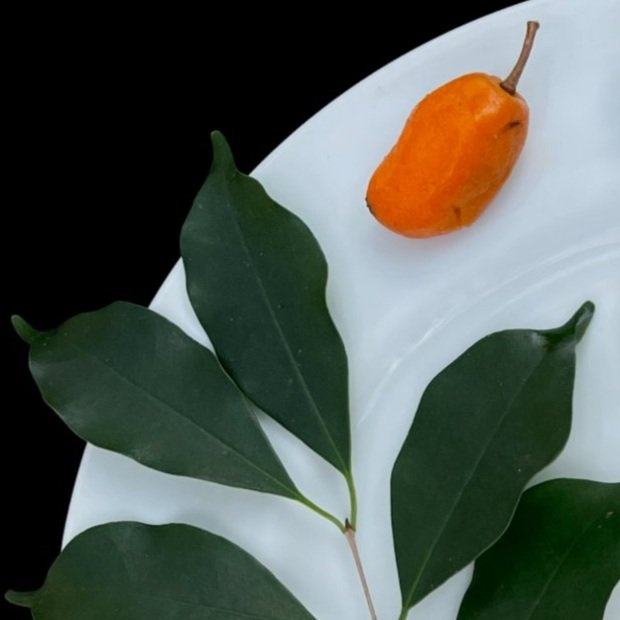Eugenia Tumescens var. Laranjinha Azeitona - GERMINATED
Seeds were imported from Brazil. Seeds will arrive germinated. I have less than 10 of these available. This Eugenia produces olive-shaped fruits (ellipsoids), measuring 2.5-3.5 cm x 1.8-2.5 cm, with an intensely orange peel, with a glandular-rough surface, and a sweet pulp, with no astringency at all. The plant is a 2-3 m small tree, rarely reaching a larger size (up to 10 m) in virgin forest. Its leaves are elliptical or obovate, dark green above and lighter below. Fruit consumed raw, or in the form of juice, jam, ice cream, drinks, etc. The tree is very useful for reforestation because it attracts fauna. It has good landscape attributes. Rustic species, adapts well to various types of soil and climate. It bears fruit early, at approximately three years of age. It can be grown in pots, thanks to its small size and ease of bearing fruit. nitially found in the Atlantic Forest in Pernambuco.
Seeds were imported from Brazil. Seeds will arrive germinated. I have less than 10 of these available. This Eugenia produces olive-shaped fruits (ellipsoids), measuring 2.5-3.5 cm x 1.8-2.5 cm, with an intensely orange peel, with a glandular-rough surface, and a sweet pulp, with no astringency at all. The plant is a 2-3 m small tree, rarely reaching a larger size (up to 10 m) in virgin forest. Its leaves are elliptical or obovate, dark green above and lighter below. Fruit consumed raw, or in the form of juice, jam, ice cream, drinks, etc. The tree is very useful for reforestation because it attracts fauna. It has good landscape attributes. Rustic species, adapts well to various types of soil and climate. It bears fruit early, at approximately three years of age. It can be grown in pots, thanks to its small size and ease of bearing fruit. nitially found in the Atlantic Forest in Pernambuco.
Seeds were imported from Brazil. Seeds will arrive germinated. I have less than 10 of these available. This Eugenia produces olive-shaped fruits (ellipsoids), measuring 2.5-3.5 cm x 1.8-2.5 cm, with an intensely orange peel, with a glandular-rough surface, and a sweet pulp, with no astringency at all. The plant is a 2-3 m small tree, rarely reaching a larger size (up to 10 m) in virgin forest. Its leaves are elliptical or obovate, dark green above and lighter below. Fruit consumed raw, or in the form of juice, jam, ice cream, drinks, etc. The tree is very useful for reforestation because it attracts fauna. It has good landscape attributes. Rustic species, adapts well to various types of soil and climate. It bears fruit early, at approximately three years of age. It can be grown in pots, thanks to its small size and ease of bearing fruit. nitially found in the Atlantic Forest in Pernambuco.






